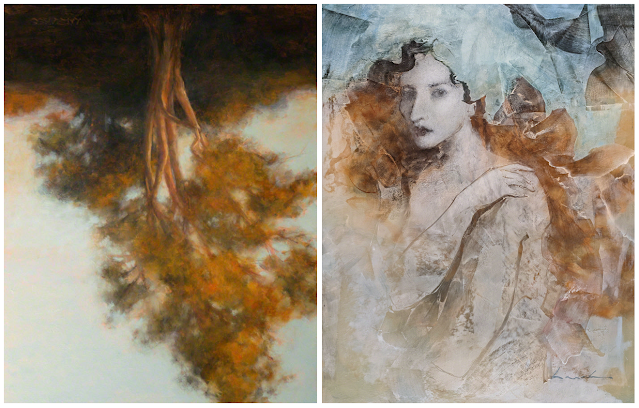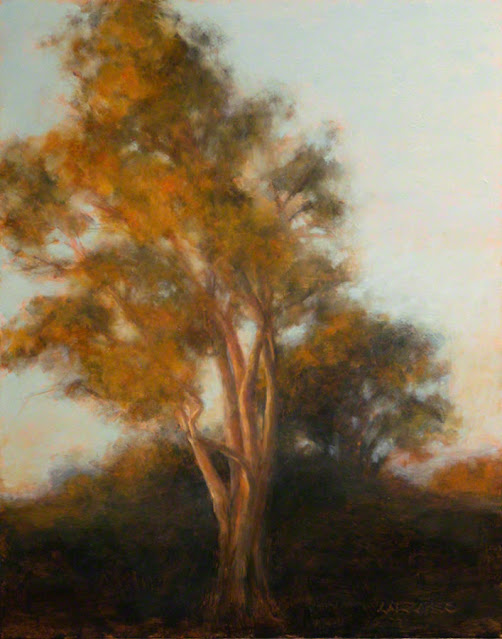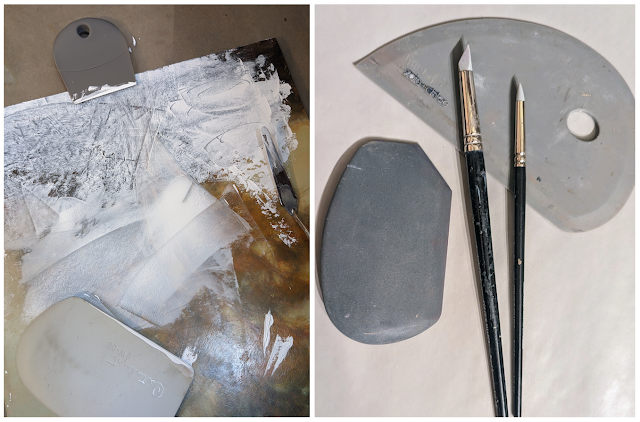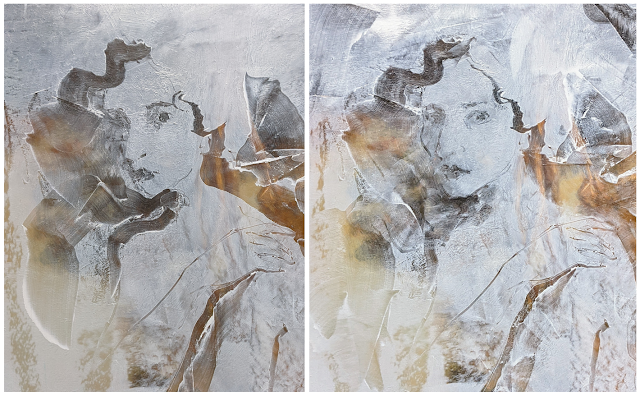by Lisa Larrabee
Do you every wonder what to do with old artwork that you feel is kind of meh? Recycle it. Better yet, upcycle it and make it better! There are so many possibilities when it comes to upcycling your artwork. Allow yourself to respond to what you have while simultaneously letting it go.
I had some silicone paint shapers that I really wanted to play around with. Rather than starting on a blank surface, I looked for an existing painting that already had some nice colors and textures that I could build on. I created this Eucalyptus as a study for a larger piece. I didn't love the painting, so I decided to have fun and turn it into something completely new.
Explore New Tools
Color shapers are versatile tools that let you push paint around with a flexible silicone tip at the end of a long handle like a brush. I used color shapers with a tapered point and an angled chisel. I also used a mix of rigid and flexible painting wedges as well as a pallet knife. I began by turning my painting upside down so that I would be less tempted to see the tree as a distraction. This also placed the darker values at the top which would create more contrast as I scraped marks into it. I applied titanium white oil paint directly from the tube and began pushing it around using the various tools.
The color shapers allowed me to sketch directly into the paint revealing the colors underneath.
This process is incredibly forgiving. If you make mistakes, you can blend them away with the smooth edge of a painting wedge and try again. I found more satisfaction in trying to create bold, interesting marks with the scrapers rather than controlled, accurate marks. I went back and forth, trying new marks and refining some shapes. You can see in the example below how areas can easily be reworked.
Using the various scraping and shaping tools was incredibly fun. The bolder the mark, the more the original painting was revealed. There was an exciting sense of freedom and of not knowing what to expect with each step. When I finished pushing the paint around, I was unsure of what to do next. While letting it dry, I considered what my responses could be. I did not want to overwork it. I wanted to maintain the loose the spontaneity that I felt during the process. I decided to let the original painting speak by bringing in some of the golds and blues of the landscape painting. I used transparent pigments mixed with a quick drying alkyd medium to glaze some colors over the top to enhance certain shapes without covering the original marks.
Transformation Complete
Many paintings are special and a significant piece of your artistic journey. Cherish them and look back to see the path you have taken and the distance you have come. However, there are many practice attempts along the way. Don't be afraid to dig into your old paintings and make them new. Our failures have the potential for incredible growth and transformation if we choose to see it.
Art Challenge
Upcycle your artwork.
- Choose a drawing or painting that you are willing to let go and transform.
- Consider a process that will allow you to make a bold new start or you may end up just reworking the old piece.
- Old drawings, pastels or watercolor paintings can be great for collage. Cut them apart, weave them back together and combine pieces.
- Use an opaque medium that allows for bold coverage, but don't loose it all. You can always sand down and paint a canvas back to white. Instead, consider how you can respond to the colors and textures of the old painting as you take the piece in a totally new direction.
- Change the orientation of the artwork if you feel it will be a distraction or if you want to shift the location of colors or values.
- Experiment with new tools. Might I suggest paint shapers and wedges?
- Have fun! If it fails, who cares? You didn't love the old painting anyway. Take the chance.






